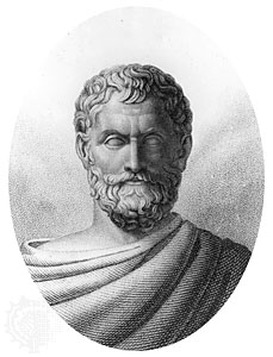Ancient Greek Scientists/Philosophers  Thales Thales This week we began with a review of the scientists/philosophers of Ionia that students have been reading about in their text. We discussed the observations, insights, and theories of Thales, Anaximander, Anaximenes, and Anaxagoras. These four early Greek thinkers used reason rather than superstition to explain events in nature and thus launched the beginnings of the western scientific tradition. Students then broke into small groups and collaborated to answer questions about several other important Greek figures - Empedocles and Herodotus. We discussed the importance of Empedocles theory of four elements (earth, air, fire, and water) as one of the most enduring and influential ideas in the history of science. His theory dominated scientific thinking for 2,300 years! We also agreed that Herodotus, the world's first historian, was critical to the development of science since his collected and organized information provided knowledge for future scientists and philosophers to build upon. We discussed the contributions of the Phoenicians in navigation (by the stars), exploration (in cleverly crafted ships), and the spread of scientific knowledge to many countries. Their development of the alphabet further allowed scientific learning to be written down and shared. We looked at the specific scientific tools that these ancient scientists/philosophers had available to them (using the Student Quest Guide) and noted that during this time in history, they had little beyond their own observations of the world around them and their logic and reason to interpret how the world works. From these beginnings and the minds of these amazing early scientists came the development of astronomy, mathematics, and geometry.
Comments are closed.
|
Categories
All
Archives
May 2016
|

 RSS Feed
RSS Feed